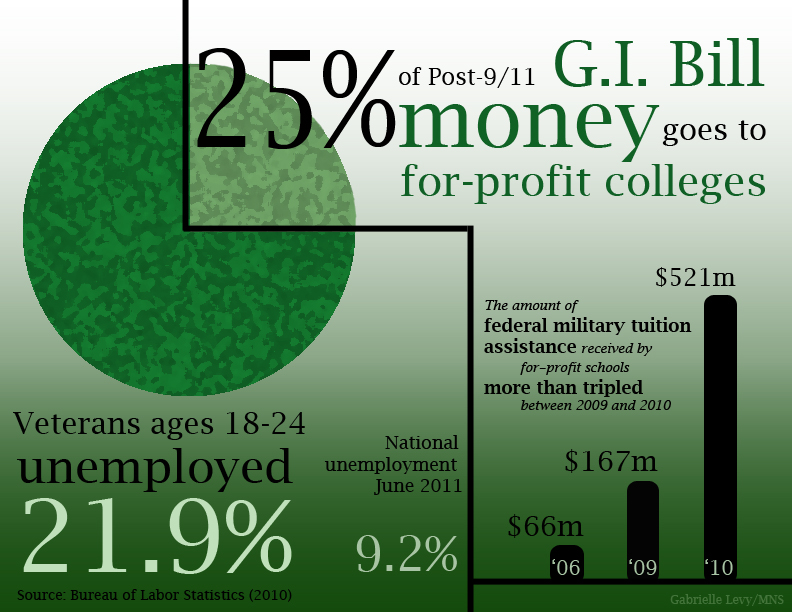WASHINGTON–The questionable nature of for-profit college degrees has drawn fire from lawmakers but has some military employers less worried about just how useful these can be for an increasing number of unemployed veterans.
In 2010, the Bureau of Labor Statistics found that 21.9 percent of male veterans ages 18 to 24 were unemployed, as were 13.1 percent of those 25 to 34. Many positions at companies that contract with the Department of Defense, often
Sen. Tom Harkin, D-Iowa, said that the legislation could require the military to more closely scrutinize how many military men and women are using their GI bill benefits at for-profit schools.“They need to know who’s signing up for these courses, how much are they costing, where’s the money going, and what’s happening to these young men and women,” Harkin said.“Right now as we know, people are dropping out at astonishing rates from these schools. Within one year, a half a million students left these schools with no diploma, no degree, but a lot of debt. But we don’t know how many of those are military people.”Retention rates have been a subject of great debate among for-profit colleges, leading to an American Public University System study of six online institutions to determine factors that relate to retention in order to help online schools better serve their student base.
No comprehensive study has been done on online degree retention rates.
The amount of federal military tuition assistance received by for-profit schools more than tripled between 2009 and 2010 to $521 million. And it is expected to grow as the wars in Iraq and Afghanistan wind down and the returning service members leave the military for the private sector. At least 10 percent of a for-profit school’s funding must come from sources other than the federal government. GI bill benefits, however, can be counted within this 10 percent.
Private for-profit colleges often charge tuition above the $5,500 per year GI benefit cap, with excess funding coming through student loans. Nearly 25 percent of students at for-profit schools are defaulting on their loans within three years of leaving school.
in technical fields such as engineering or aeronautics, require a bachelor’s degree.
For-profit schools, especially those with online degrees, have been an increasingly popular among service members and veterans despite criticism from academics and lawmakers who say those degrees don’t offer enough value.
And some employers say that service members often bring other skills to the table that reduce the emphasis on education in the hiring process.
Lockheed Martin was one of the few companies willing to openly discuss its hiring practices. The company, which participates in an employer partnership with the armed forces, said a degree from a for-profit college is enough when combined with other military skills.
“Not to downplay really good accredited schools,” spokesman for Lockheed Martin Chris Williams said, “I honestly don’t know that we would [discriminate between degrees]. I honestly think it goes back to what the degree is in and the specialization.”
Ferris Morrison, a spokeswoman for Bank of America, said the source of a degree — or having one at all — often doesn’t play into the hiring process.
“We don’t view any type of degree as any different,” Morrison said.
Engineering company Siemens AG said veterans’ skills learned in the military are its main focus and declined to comment on the value of a for-profit degree.
When asked if they distinguish between degrees from online or for-profit schools and traditional colleges, a number of companies were reluctant to provide specific details. These companies, as well as Lockheed Martin, are involved in President Barack Obama’s recent initiative to employ more veterans through direct employer partnerships.
Computer technology company Hewlett-Packard Co. declined to comment. Insurance company Humana Inc., computer company Microsoft Corp. and manufacturer Honeywell Inc. had no immediate comment.
“If it were the case that all degrees were created equal, and there was no reluctance for employers to recognize these diploma mills, they would say so on the record,” said Barmack Nassirian, of the Association of American College Registrars and Admissions Officers, a nonprofit education advocacy group.
Sen. Tom Harkin, D-Iowa, and a number of other critics have decried the lack of Defense Department oversight of GI Bill funds and the value of the degrees veterans earn at for-profit schools.
“In many cases, the degrees that they get from these for-profit colleges aren’t worth very much,” said Harkin, who is also the chair of the Senate Health, Education, Labor and Pension committee. “See, they only get one shot at it. They get one time at this money, and if they don’t get anything, they can’t come back and get some more.”
Master Sgt. Kimberly Byers worked towards her bachelor’s degree online through the for-profit American Military University while deployed in Afghanistan, and is now pursuing her master’s degree at AMU as well. She said a combination of military skills and a degree makes a returning service member more marketable, but that the education component is crucial.
“I’ve talked to several soldiers who’ve come back and said there’s no jobs out there, and that’s not the case,” Byers said. “If you have an education to back [your veteran or disability status] up you are even more marketable.”

